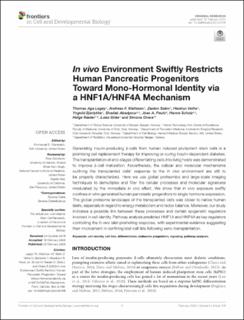| dc.contributor.author | Legøy, Thomas Aga | |
| dc.contributor.author | Mathisen, Andreas Frøslev | |
| dc.contributor.author | Salim, Zaidon | |
| dc.contributor.author | Vethe, Heidrun | |
| dc.contributor.author | Bjørlykke, Yngvild | |
| dc.contributor.author | Abadpour, Shadab | |
| dc.contributor.author | Paulo, Joao | |
| dc.contributor.author | Scholz, Hanne | |
| dc.contributor.author | Ræder, Helge | |
| dc.contributor.author | Ghila, Luiza | |
| dc.contributor.author | Chera, Simona | |
| dc.date.accessioned | 2021-02-11T10:57:55Z | |
| dc.date.available | 2021-02-11T10:57:55Z | |
| dc.date.created | 2020-09-18T10:47:59Z | |
| dc.date.issued | 2020 | |
| dc.Published | Frontiers in Cell and Developmental Biology. 2020, 8, 109. | en_US |
| dc.identifier.issn | 2296-634X | |
| dc.identifier.uri | https://hdl.handle.net/11250/2727394 | |
| dc.description.abstract | Generating insulin-producing β-cells from human induced pluripotent stem cells is a promising cell replacement therapy for improving or curing insulin-dependent diabetes. The transplantation of end-stages differentiating cells into living hosts was demonstrated to improve β-cell maturation. Nevertheless, the cellular and molecular mechanisms outlining the transplanted cells’ response to the in vivo environment are still to be properly characterized. Here we use global proteomics and large-scale imaging techniques to demultiplex and filter the cellular processes and molecular signatures modulated by the immediate in vivo effect. We show that in vivo exposure swiftly confines in vitro generated human pancreatic progenitors to single hormone expression. The global proteome landscape of the transplanted cells was closer to native human islets, especially in regard to energy metabolism and redox balance. Moreover, our study indicates a possible link between these processes and certain epigenetic regulators involved in cell identity. Pathway analysis predicted HNF1A and HNF4A as key regulators controlling the in vivo islet-promoting response, with experimental evidence suggesting their involvement in confining islet cell fate following xeno-transplantation. | en_US |
| dc.language.iso | eng | en_US |
| dc.publisher | Frontiers Media | en_US |
| dc.rights | Navngivelse 4.0 Internasjonal | * |
| dc.rights.uri | http://creativecommons.org/licenses/by/4.0/deed.no | * |
| dc.title | In vivo environment swiftly restricts human pancreatic progenitors toward mono-hormonal identity via a HNF1A/HNF4A mechanism | en_US |
| dc.type | Journal article | en_US |
| dc.type | Peer reviewed | en_US |
| dc.description.version | publishedVersion | en_US |
| dc.rights.holder | Copyright 2020 The Authors | en_US |
| dc.source.articlenumber | 109 | en_US |
| cristin.ispublished | true | |
| cristin.fulltext | original | |
| cristin.qualitycode | 1 | |
| dc.identifier.doi | 10.3389/fcell.2020.00109 | |
| dc.identifier.cristin | 1831103 | |
| dc.source.journal | Frontiers in Cell and Developmental Biology | en_US |
| dc.source.40 | 8 | en_US |

